
"This is what Poland is like now." Krakow translator is sentenced for supporting Russia
/ Главная / Russkiy Mir Foundation / Publications / "This is what Poland is like now." Krakow translator is sentenced for supporting Russia"This is what Poland is like now." Krakow translator is sentenced for supporting Russia
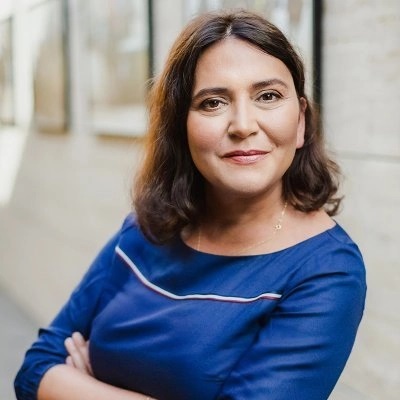
Photo: Nikolina Shmukler-Matasova. Photo courtesy of Nikolina Schmukler-Matasova
Krakow District Court convicted Polish citizen Nicolina Schmukler-Matasova for a "positive attitude towards Russia.” Nikolina is a sworn interpreter, she has been teaching Russian at her Russian Language Study and Translation Center for many years. Over the past few years she was subjected to harassment for not having fear to support Russia's position.
- A Polish court recently sentenced you to four months' suspended imprisonment for giving information to Russian media about a special military operation in your social networks. Why was such a decision was made, and what preceded this?
- In addition to the suspended sentence, there is a fine of 5000 zlotys plus the costs of the trial - about 2000 zlotys (in total about $1660 – Editor.). Why? Because we have such different institutions and individuals in our country, mostly Ukrainian refugees, who are watching me for a long time. I assume this hatred is going on since the annexation of Crimea, when a Cross Year of Culture between Russia and Poland in 2015 - 2016 was cancelled.
Afterwards, at my own expense, I organized the Year of Russian Culture in Krakow, which was a great success. This is when the surveillance of me has began. I faced a lot of hatred from Ukrainians at that time. Then, for a while, everything seemed to calm down. But the "bomb" exploded when I made two posts last February. The first was from February 17: "Ukraine is shelling the Donetsk People's Republic.” And the second was on February 22, where I posted information about Russia's recognition of the independence of the DNR and LNR and my support of that decision.
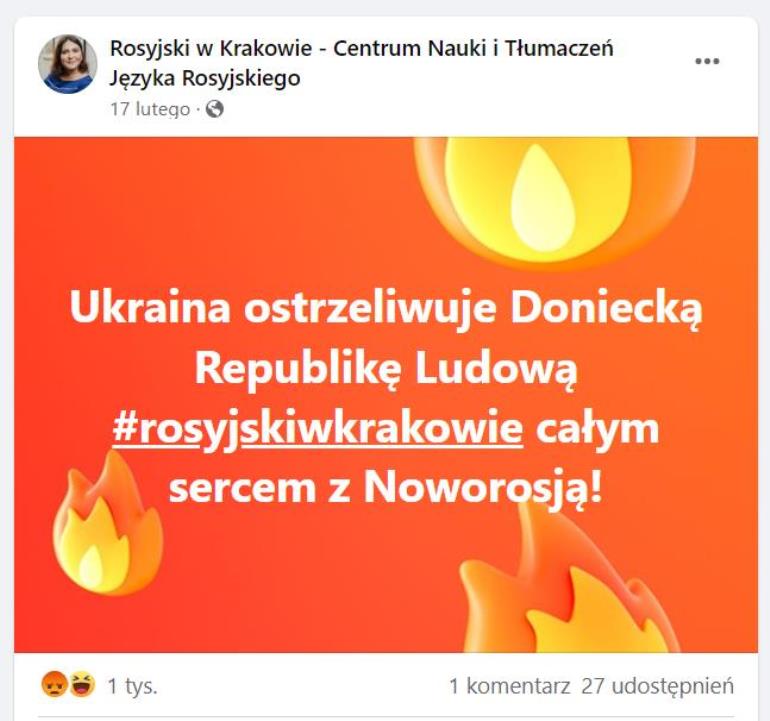
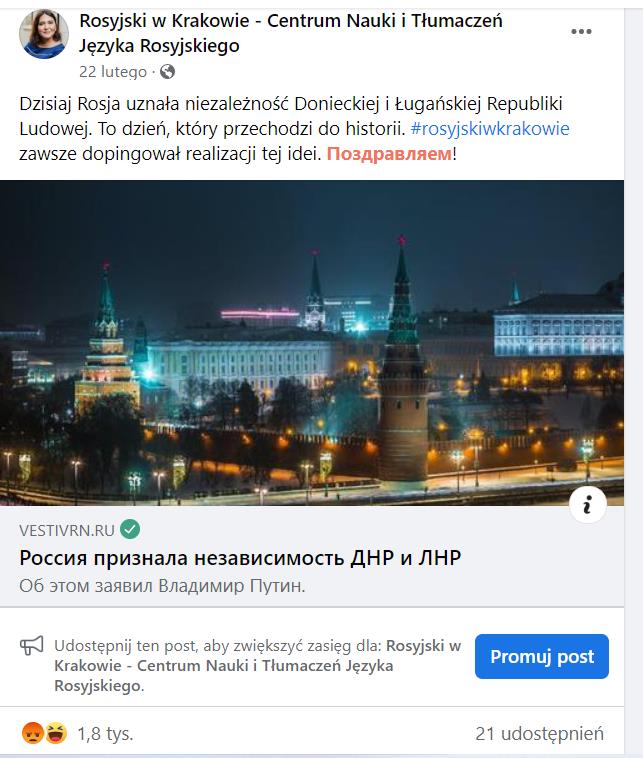
Photo: two posts that became the starting point of N. Schmuckler's pursuit
I have always supported Russia and all of its actions in my social networks. But starting in February 2022, a real manhunt began: people tried to hack into my website and corporate email, the police received calls to come and check on me. There were spam attacks on my phone number. Insulting slogans appeared on the stairwell and on a wall of the house where I lived. The same insults were poured on me in social networks. My phone number was constantly receiving text messages threatening my life and health and insulting me.
On March 7 2022, the Commission on the Professional Responsibility of Sworn Interpreters at the Ministry of Justice initiated professional responsibility proceedings against me as a sworn interpreter. I was accused of violating ethics and impartiality because I did not agree to perform translations for people who insulted Russia in their social networks. I have now been stripped of my credentials as a sworn interpreter of Russian, although I have worked in that position for 19 years and have never received any complaints.
I was accused of recognizing Crimea as Russian territory and the DNR and LNR as part of Russia, that Russia is only reclaiming its own lands. Also the topic of Kosovo is important to me. I have always written that Kosovo is a part of Serbia, as I am from a Polish-Yugoslav family myself. I was also accused of quoting the director Nikita Mikhalkov, when he explains his position on the special operation.
There is a Center for Monitoring Racist and Xenophobic Behavior in Poland, which tracks and identifies all Poles who publicly support Russia. I'm not the only one who thinks and talks about this. But now it's getting dangerous. After I was sentenced, various anonymous people wrote me saying that the probation was just the beginning, and that they would continue spying on me.
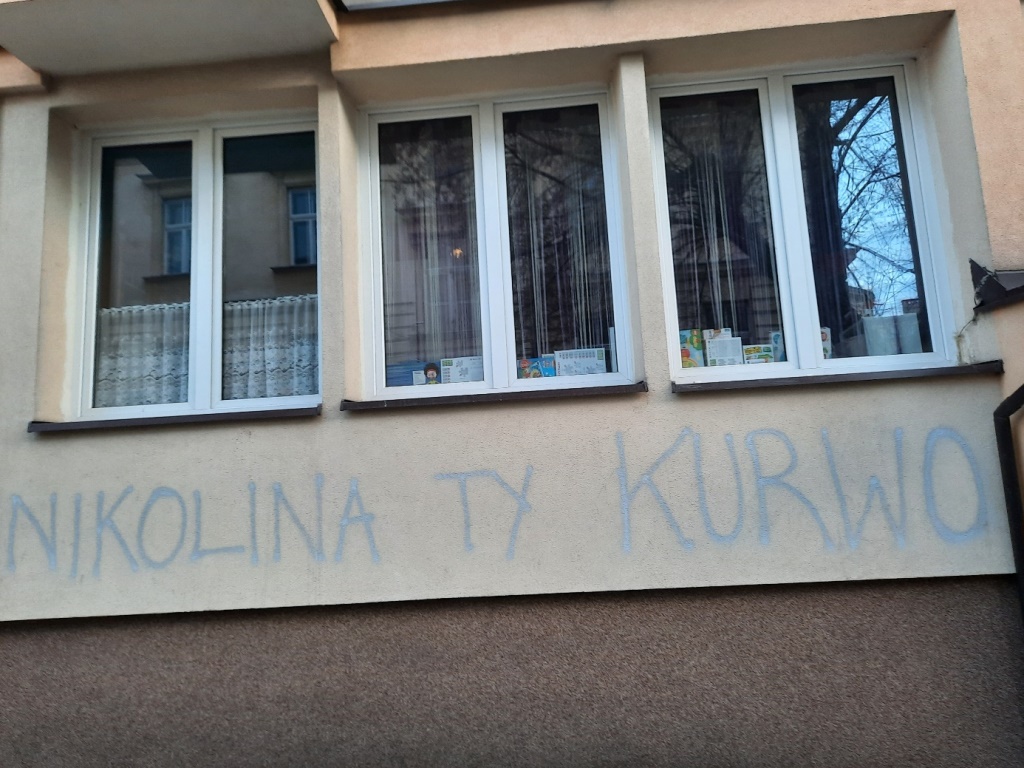
Photo: An offensive inscription on the house of Nikolina Shmukler. Photo courtesy of Nikolina Shmukler-Matasova
- Are there many sensible people in Poland who want to get information from different sources, not only from Ukrainian sources?
- I know one researcher, who was fired because he loves Russia and is not afraid to talk about it. And of course, there are people who are well aware that this is not a war between Russia and Ukraine, but behind Ukraine is America, which unleashed this war. For making such statements one is immediately getting accused of supporting "Putin's regime". Ukrainian refugees vigilantly monitor all such statements in social networks.
- Can you read and watch Russian media with an alternative point of view in Poland today?
- Only through vpn. And of course, many thinking people are not satisfied with this. One of the clients of my Center for Russian Language Studies and Translation in Krakow has always been pro-Ukraine, but even he is puzzled why we are cut off from official Russian sources. If they limit us, does it mean they are hiding something? These are many questions people ask. And the Polish media, unfortunately, is literally saturated with hatred for Russia and Putin.
- Until recently, there were many schools in Poland that taught the Russian language. What's happening to them now?
- When I graduated from university, I taught Russian at school for a while. But even then the Russian language was gradually disappearing from the school programs. And now in Krakow and in the rest of Poland there are Ukrainian schools with the Ukrainian language and Ukrainian history. Today, there are almost no or very few Russian language lessons in Polish schools.
- There are about 5 million Ukrainian refugees in Poland. Has Poles' attitude towards them started to change after a year?
- Yes, there are a lot of refugees from Ukraine. The main places where they have settled are Warsaw, Krakow, and Wroclaw. There was a huge wave of help at the beginning, but now people are tired. Ukrainian refugees organize events almost every day at the Mickiewicz Monument in Krakow. They gather there with flags, anthems and ask same thing: give us more weapons, we are defending you from Russia, and you should help us. Then they go and collect money. Poles are no longer as willing to give money. Many refugees live for half a year or more for free, and they don't want to even look for work.
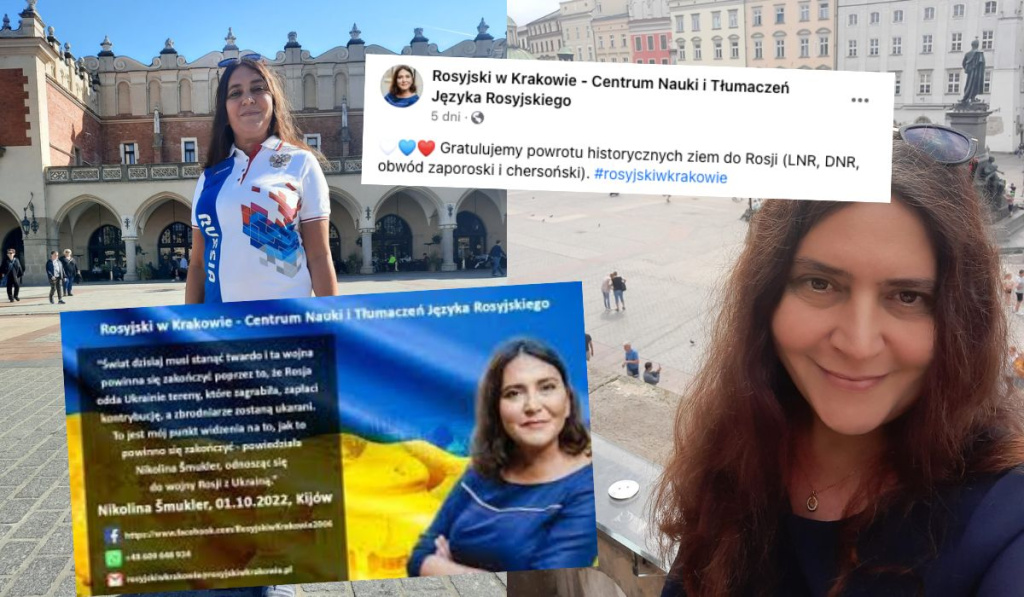
Photo courtesy of Nikolina Shmukler-Matasova
- The president of Poland recently hosted Zelensky and said that soon there would be no borders between Poland and Ukraine. Many understood this as a possible unification of the two countries. How do Poles feel about this idea? Do they want to merge with Ukraine?
- No, no, we do not want to merge with Ukraine. But there is such a risk, especially since Zelensky was awarded the highest state award of Poland, the Order of the White Eagle.
- Your family has Russian roots, your paternal grandfather was from the Russian Empire...
- Yes, he was a white officer, left Russia in 1920 and went to the Kingdom of Serbs, Croats and Slovenes in Novi Sad. I have his documents, and I hope that it will help me to move to Russia under the new program of resettlement of compatriots.
- Even now, when relations between Russia and Poland are very tense, you try to maintain good relations between our peoples. In April you held a Polish song concert in Moscow...
- I have good partners in Moscow, every few months we try to organize such events of friendship. The next concert will take place in Moscow in September. It is very important for us because I understand that there can be different attitude to Poles in Russia. So it is important for me to show that we love and respect your country and culture. Every year on May 9, together with my friends in Cracow, we go to the cemetery where Soviet soldiers who liberated Poland are buried.
- You are an amazingly brave woman. Even after the court decision you wrote in social networks, "I support Russia with all my heart, I wish her victory and keep my fingers crossed!" Aren't you afraid that this will further complicate your situation?
- My lawyer asks me not to write about Russia, so that the prosecution does not recur. To my questions she answers: well, that's the way Poland is now.
New publications

 Mikhail Kalatozov, a director who transformed the world of cinematography in many ways, was born 120 years ago. He was a Soviet film official and a propagandist. Above all, he was capable of producing movies that struck viewers with their power and poetic language.
Mikhail Kalatozov, a director who transformed the world of cinematography in many ways, was born 120 years ago. He was a Soviet film official and a propagandist. Above all, he was capable of producing movies that struck viewers with their power and poetic language.  Ukrainian authorities have launched a persecution campaign against the canonical Ukrainian Orthodox Church (UOC), the biggest one in the country's modern history. Over the past year, state sanctions were imposed on clergy representatives, searches were conducted in churches, clergymen were arrested, criminal cases were initiated, the activity of the UOC was banned in various regions of the country, and monasteries and churches were seized.
Ukrainian authorities have launched a persecution campaign against the canonical Ukrainian Orthodox Church (UOC), the biggest one in the country's modern history. Over the past year, state sanctions were imposed on clergy representatives, searches were conducted in churches, clergymen were arrested, criminal cases were initiated, the activity of the UOC was banned in various regions of the country, and monasteries and churches were seized.  When Nektary Kotlyaroff, a fourth-generation Russian Australian and founder of the Russian Orthodox Choir in Sydney, first visited Russia, the first person he spoke to was a cab driver at the airport. Having heard that Nektariy's ancestors left Russia more than 100 years ago, the driver was astonished, "How come you haven't forgotten the Russian language?" Nektary Kotlyaroff repeated his answer in an interview with the Russkiy Mir. His affinity to the Orthodox Church (many of his ancestors and relatives were priests) and the traditions of a large Russian family brought from Russia helped him to preserve the Russian language.
When Nektary Kotlyaroff, a fourth-generation Russian Australian and founder of the Russian Orthodox Choir in Sydney, first visited Russia, the first person he spoke to was a cab driver at the airport. Having heard that Nektariy's ancestors left Russia more than 100 years ago, the driver was astonished, "How come you haven't forgotten the Russian language?" Nektary Kotlyaroff repeated his answer in an interview with the Russkiy Mir. His affinity to the Orthodox Church (many of his ancestors and relatives were priests) and the traditions of a large Russian family brought from Russia helped him to preserve the Russian language.

 The leaders of the Friends of the Great Russia cultural association (Amici Della Grande Russia) in Italy believe that the Western policy of abolishing Russian culture in Europe has finally failed. Furthermore, it was doomed to failure from the beginning.
The leaders of the Friends of the Great Russia cultural association (Amici Della Grande Russia) in Italy believe that the Western policy of abolishing Russian culture in Europe has finally failed. Furthermore, it was doomed to failure from the beginning.  Name of Vladimir Nemirovich-Danchenko is inscribed in the history of Russian theater along with Konstantin Stanislavski, the other founding father of the Moscow Art Theater. Nevertheless, Mr. Nemirovich-Danchenko was a renowned writer, playwright, and theater teacher even before their famous meeting in the Slavic Bazaar restaurant. Furthermore, it was Mr. Nemirovich-Danchenko who came up with the idea of establishing a new "people's" theater believing that the theater could become a "department of public education."
Name of Vladimir Nemirovich-Danchenko is inscribed in the history of Russian theater along with Konstantin Stanislavski, the other founding father of the Moscow Art Theater. Nevertheless, Mr. Nemirovich-Danchenko was a renowned writer, playwright, and theater teacher even before their famous meeting in the Slavic Bazaar restaurant. Furthermore, it was Mr. Nemirovich-Danchenko who came up with the idea of establishing a new "people's" theater believing that the theater could become a "department of public education."  "Russia is a thing of which the intellect cannot conceive..." by Fyodor Tyutchev are famous among Russians at least. December marks the 220th anniversary of the poet's birth. Yet, he never considered poetry to be his life's mission and was preoccupied with matters of a global scale. Mr.Tyutchev fought his war focusing on relations between Russia and the West, the origins of mutual misunderstanding, and the origins of Russophobia. When you read his works today, it feels as though he saw things coming in a crystal ball...
"Russia is a thing of which the intellect cannot conceive..." by Fyodor Tyutchev are famous among Russians at least. December marks the 220th anniversary of the poet's birth. Yet, he never considered poetry to be his life's mission and was preoccupied with matters of a global scale. Mr.Tyutchev fought his war focusing on relations between Russia and the West, the origins of mutual misunderstanding, and the origins of Russophobia. When you read his works today, it feels as though he saw things coming in a crystal ball...